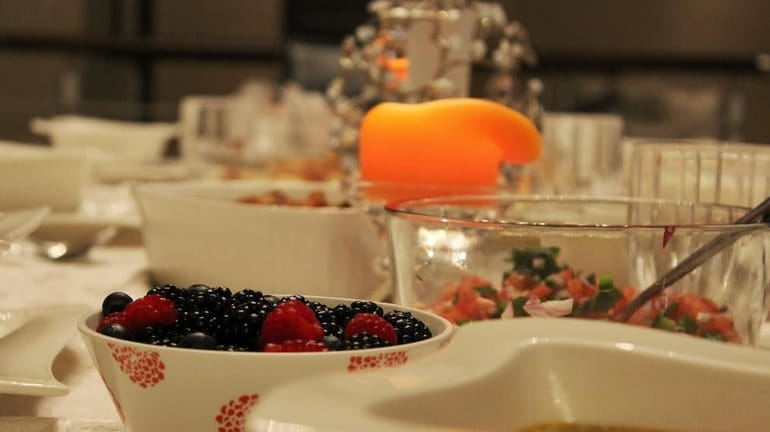Can fasting for Ramadan also benefit your health?

A typical iftar spread, the meal that breaks the fast, in a Long Island home. Nutritionists say that the discipline and food choices that come with fasting could lead to better eating habits. (Aug. 1, 2013) Credit: Sophia Azizi
Every morning for the past three weeks I’ve been waking up around 3 a.m., a couple of hours shy of the sunrise. Dragging myself out of bed, I focus my thoughts on two words: protein and water.
No, this isn't the latest diet trend. It’s Ramadan.
As a Muslim, I’ve practiced the month of fasting since I was a kid. Back then, Ramadan -- which follows the lunar calendar -- would fall during the winter months when the days were shorter.
This year, Ramadan came smack in the middle of summer. So a typical day of fasting, when Muslims give up food and drink between sunrise and sunset, lasts upward of 15 hours.
My non-Muslim peers are shocked by this tradition, wanting to know why I would put myself at risk of dehydration, hunger and chocolate deprivation.
However, many nutritionists agree that fasting, if practiced correctly, does not pose any hazards and might actually be beneficial to our health. The tradition is not limited to Islam, but can be found in Judaism and Buddhism and other faiths.
“The more that I read [about fasting], the spiritual benefits, the mental preparation, the discipline and the planning ahead, the religious fasting for several hours, for several weeks, can be a rewarding experience,” said Nina Eng, a nutrition coordinator at Plainview Hospital.
Eng and Armin Khan, the assistant director of Food and Nutrition Services at the Long Island Jewish Medical Center, said the discipline and food choices that come with fasting could lead to better eating habits.
“Your metabolism does slow down. In the beginning, you’re going to have issues. How well you feel depends on what you’re eating. Good eating habits, less symptoms,” Khan said.
Fasters tend to feel sluggish, get headaches and can dehydrate if they don’t make smart choices in those first wee hours of the morning. It's essential that fasters strategize the best possible way to take in all the nutrients and liquids they need during the few hours they have to eat, Eng said.
“In the morning, you want to make sure you have protein, fiber and fluids .?.?. You want to get the most nutrition for what you are eating,” Eng said.
And when you break the fast, it's equally important not to overcompensate and try to eat too much; instead, choose food that will sustain your energy levels.
Armin, who is Muslim and also practices the fast, says she always tries to get her family to break their fast with healthy, non-fried, nonfat options such as fruit smoothies, raw fruits and vegetables, dairy products and water. That can be a challenge, since cultural craving for fried items override smart food choices.
Outside of weight loss, fasting can also contribute to brain health.
Fasting enables the production of ketone bodies, which is the only thing besides glucose that the brain can use as fuel, according to Dr. Christopher Ochner, a research associate at New York Obesity Nutrition Research Center of St. Luke's Roosevelt Hospital Center.
Ketone bodies, a by-product when fatty acids are broken down, may be a cleaner burning fuel that people are able to better utilize, Ochner said.
While Ochner understands the potential benefits of fasting, he doesn’t see the practice of fasting as extraordinary. He likens the fast to the time some people sleep.
If a person eats an early dinner and skips breakfast, he’s going without food for the same amount of time, Ochner said, a practice that is sometimes recommended to help patients with brain ailments such as Alzheimer’s disease.
The benefits derived from fasting, like most eating regiments, comes from making good choices. Which can be a challenge when those choices are being made on an empty stomach.
As times have changed and healthy eating becomes more widespread in the U.S., the end of the fast has changed for many Muslims as well.
Growing up, my mother used to get up even earlier than my sister and me to prepare an entire meal of fried bread or rice and meat. We’d break fast with deep-fried samosas and sweets.
Now, when I visit, my mom -- who no longer fasts due to her age -- will still get up before me. But nowadays she prepares an omelet with vegetables and cheese, whole wheat bread, a bowl of yogurt, a cup of milk and a glass of water.
Updated 40 minutes ago Suspected cop shooter in court ... Police looking to identify remains ... Trump trial ... Post-pandemic special needs schooling
Updated 40 minutes ago Suspected cop shooter in court ... Police looking to identify remains ... Trump trial ... Post-pandemic special needs schooling
